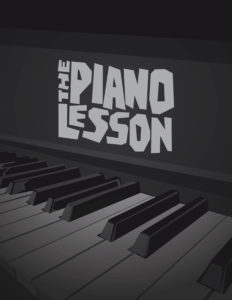
August Wilson’s Pulitzer Prize-winning masterpiece “The Piano Lesson” will be presented at 7:30 p.m. Thursday through Saturday, Sept. 28 through 30, and at 2 p.m. Saturday and Sunday, Sept. 30 and Oct. 1, in the new Flex Theatre on the campus of Stephen F. Austin State University.
Opening Sept. 28 for a four-day run, “The Piano Lesson” is described as “the play for now.”
“It reaches into the souls of the present, revealing startling truths about how we perceive our past – and who gets to define our legacy,” according to information at pianolessonplay.com.
Cleo House Jr., director of the School of Theatre and Dance, selected Wilson’s play as “something special” for SFA theatre students to present in the new theatre space and as the opening production for the Mainstage Centennial Season celebrating SFA’s 100 years.
“Funny enough, in our 100 years of theatre at SFA, we have never performed an August Wilson play as part of the Mainstage season,” House said. “In my mind, we needed to do something special for our inaugural production in the brand new space.”
A prolific and celebrated playwright, Wilson wrote a collection of 10 plays that make up the Pittsburgh Cycle. Each play takes place in a different decade exploring the vastness of the African-American experience over the last 100 years, and all but one of the plays were set in Pittsburgh’s Hill District.
In “The Piano Lesson,” lead character Boy Willie travels to Pittsburgh to convince his sister, Berniece, to sell a family heirloom piano that she doesn’t want to sell. Boy Willie wants to use the piano proceeds to purchase the same Mississippi land that their family had worked as slaves.
“The piano has a history that connects Boy Willie and Berniece to the Sutter family, who enslaved their ancestors,” House explains. “The most recent Sutter has just passed away, and Boy Willie wants to buy the remaining part of the plantation, if he can get the money. However, Berniece doesn’t want to sell the piano because she knows it has caused great pain to their family before.”
It’s unclear who killed Sutter. Different people give different explanations, and the more they talk about it, the less certain the truth becomes, according to House. Berniece believes that Boy Willie might have done it. Boy Willie claims it was the Ghosts of the Yellow Dog, vengeful spirits of Mississippi who punish certain white men. But something is causing Sutter’s restless spirit to roam.
“‘The Piano Lesson,’ as a script alone, is enigmatic and requires as much study as Shakespeare,” House said. “So my approach to directing this play leans heavily in developing a strong comprehension of the text and then an understanding of what is not being stated directly but that the audience needs to perceive. I also plan to really explore the ethereal and ghostly parts of the show. It’s both kitchen-sink dramedy (drama/comedy) and a little bit ghost story.”
House believes “The Piano Lesson” is appropriate for all ages, “from junior high students to our most senior citizen.”
“It is for anyone who loves language and rhythm,” he said. “August Wilson does such a great job with dialogue; it feels and sounds natural. The characters will remind the audience of people they already know or have met. The play is also surprisingly funny, which is a tribute to Wilson’s deft writing hand.”
Wilson’s love of language will be appreciated in the characters’ monologues and long speeches of reflection, according to House. “It is going to be crucial that the meaning is conveyed, and that what isn’t being said is also revealed to keep audiences engaged,” he explained.
The play opens only one month after the first day of school at SFA, making for a significantly short rehearsal time for the students and crew. “The actors are going to have to come in ready to go; there’s no time to warm up to the process,” House said. “The characters in the play have some epic speeches and dialogue that affect the rhythm of the show, so they will be put through their paces with memorization.”
House thinks the School of Theatre and Dance’s presentation of “The Piano Lesson” will “create some August Wilson fans.”
“Audiences will be entertained and enlightened,” he said. “People will leave the theatre and order his 10-play cycle to read.”
“The Piano Lesson” will be presented at 7:30 p.m. Thursday through Saturday, Sept. 28 through 30, and at 2 p.m. Saturday and Sunday, Sept. 30 and Oct. 1, in the Flex Theatre. General admission ticket prices are: adult, $15; senior (62+), $10; youth (high school and younger), $8; SFA faculty/staff, $8; non-SFA student, $8; and SFA student, $5. For ticketing information or to purchase tickets, call the Fine Arts Box Office at (936) 468-6407 or (888) 240-ARTS, or visit sfasu.edu/boxoffice. For information about the play, call (936) 468-4003 or visit sfasu.edu/theatre-dance.



